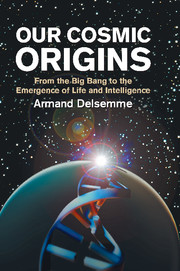Book contents
- Frontmatter
- Contents
- Foreword
- Preface
- Acknowledgments
- 1 Locating humans in the Universe
- 2 The race toward complexity
- 3 The stellar alchemy of metals
- 4 The formation of the planets
- 5 The emergence of life
- 6 The history of life
- 7 The awakening of intelligence
- 8 The other worlds
- 9 Perspectives
- APPENDIX A The standard model of the physics of elementary particles
- APPENDIX B Symmetry in physics
- APPENDIX C The strange role of time in relativity
- APPENDIX D The measurement of long time spans and the age of the Universe
- APPENDIX E The standard model of the Big Bang
- APPENDIX F The cause of the Big Bang and inflation
- APPENDIX G Chirality
- Glossary
- Bibliography
- Figure index
- Table index
- Name index
- Subject index
8 - The other worlds
Published online by Cambridge University Press: 05 August 2012
- Frontmatter
- Contents
- Foreword
- Preface
- Acknowledgments
- 1 Locating humans in the Universe
- 2 The race toward complexity
- 3 The stellar alchemy of metals
- 4 The formation of the planets
- 5 The emergence of life
- 6 The history of life
- 7 The awakening of intelligence
- 8 The other worlds
- 9 Perspectives
- APPENDIX A The standard model of the physics of elementary particles
- APPENDIX B Symmetry in physics
- APPENDIX C The strange role of time in relativity
- APPENDIX D The measurement of long time spans and the age of the Universe
- APPENDIX E The standard model of the Big Bang
- APPENDIX F The cause of the Big Bang and inflation
- APPENDIX G Chirality
- Glossary
- Bibliography
- Figure index
- Table index
- Name index
- Subject index
Summary
Burchio: Well then, the other worlds are inhabited, just as ours is?
Frascatorio: It is impossible that those countless worlds…be deprived of inhabitants similar or even superior
Giordano Bruno, About the Infinite Universe and the Worlds, 1584The plurality of inhabited worlds
Are there other worlds in the Universe that are inhabited by intelligent beings? This question has always fascinated thinkers and philosophers. In the absence of serious observational data, dreams and wishes nearly always prevail, and most answer yes to the question. The recurrent argument centers by and large on teleology: since the ‘reason for the existence of the Earth’ is to shelter the human race, the other planets would ‘serve no purpose’ if they were uninhabited.
In antiquity Lucretius said: ‘We have to believe that there are in other regions of space, other beings and other men’. In the sixteenth century, the Italian monk Giordano Bruno ‘explained’ the plurality of inhabited worlds as God's design and as the purpose of the infinite Universe; for Bruno had read Copernicus and rejected the ‘crystalline spheres’ of antiquity. He was burned at the stake only ten years before Galileo Galilei discovered the phases of Venus with his new telescope, establishing that planets are not stars, but are ‘worlds’ like the Earth since they reflect solar light like the Moon does.
When knowledge about the planets became less uncertain, the French man of letters Fontenelle published the famous Entretiens surla Pluralité des Mondes, in 1686. Later, the Dutch astronomer Christiaan Huyghens wrote Cosmotheoros on the same subject, published post humously in 1698.
- Type
- Chapter
- Information
- Our Cosmic OriginsFrom the Big Bang to the Emergence of Life and Intelligence, pp. 209 - 244Publisher: Cambridge University PressPrint publication year: 1998



